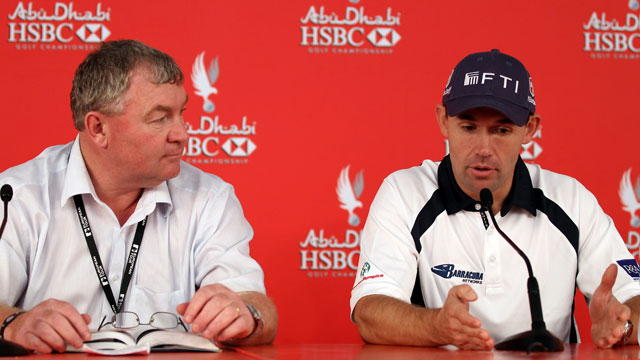NEWS
R&A might 'have a look' at changing rule involving 'trial by television'

The European Tour wrote to golf's governing body in 2008 with concern about the rule that, had it been changed, would have saved Padraig Harrington from disqualification in the Abu Dhabi Golf Championship.
Accidentally moving his ball a tiny fraction of an inch on the seventh green during his opening 65 -- good enough to put him second place -- should have cost the three-time major winner a two-stroke penalty. But, because he had already signed his scorecard when a TV viewer raised the issue with officials, he was out of the event for having signed an incorrect scorecard.
"It is very harsh -- the punishment does not really fit what the player has done," said European Tour Senior Referee Andy McFee, who disqualified Harrington. "That's unfortunate. It's something the PGA Tour and ourselves have raised with the governing bodies and as yet we have not put forward an argument that has convinced them."
After seeing slow-motion video replays, Harrington acknowledged his ball had moved slightly as he picked up the coin and accepted his disqualification. He even made light of the incident on Saturday by showing a group of children at a golf clinic how to correctly mark the ball.
He joked in a statement after the clinic that the kids “seemed to think marking your ball is all very easy, but obviously it isn’t.”
The rules in America and Mexico are administered by the U.S. Golf Association, but for the rest of the world it is the St. Andrews-based Royal and Ancient Club. R&A Rules of Golf Director Grant Moir told Press Association Sport that a letter was received from the European Tour on the matter in July 2008.
"Obviously in the light of this and what happened to Camilo Villegas (the Colombian was another victim of 'trial by television' in Hawaii earlier this month) the significance of the disqualification penalty has been brought sharply back into focus," stated Moir. "Certainly with the introduction of every-increasing scrutiny and enhanced images there is a fresh impetus to have a look at it and see if the rules are still appropriate.
"The fundamental principle is that it is the responsibility of a player to turn in an accurate score and eroding that principle would be a significant move,” he added. "But we have looked at the possibility of introducing a decision to deal with a situation where enhanced images show a breach of the rules that even the player could not know about."
Harrington's ball was brushed by his hand as he replaced it and picked up his marker. He knew the ball rocked forward and then rolled back, but thought he was okay to continue. However, the evidence of slow-motion replays was enough to convince McFee that it did not quite return to its original position.
